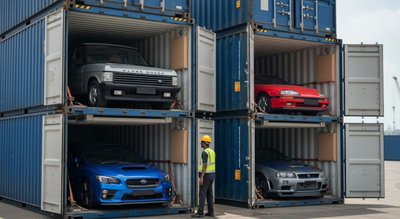
The CPD system allows duty-free entry of UAE-registered vehicles into India for up to six months, extendable upon request/ AI representative image for illustrative purposes only
Why traditional car imports to India are unaffordable for most
India’s car market is vast but limited when it comes to certain performance-focused, enthusiast-grade, and high-end models from global manufacturers. Brands like Subaru, Mazda, GMC, Lexus and even select premium lines from Ford and Toyota, often never officially make it to Indian showrooms.
And when they do, they come at a steep on-road price that includes massive import duties, unless locally assembled.This gap is understandable—India’s policies aim to protect and prioritise domestic automotive players like Tata, Mahindra, and Maruti Suzuki, which form the backbone of local production and employment. However, this leaves enthusiasts with little choice but to work with the limited trims and engine options officially available from brands like Skoda, Hyundai, and Volkswagen. These models bear the full brunt of aftermarket modifications as owners push them beyond their factory limits to approximate the driving experience they truly desire.Many in the automotive and car enthusiasts community find themselves browsing videos and online forums, filled with envy as they witness vibrant Japanese street motor shows featuring unique retro Honda or Subaru models and other rare vehicles, or the bustling scenes and high-profile road shows in Dubai and Abu Dhabi—wondering how much richer and more diverse the Indian automotive and enthusiast culture could have been.
In contrast, the UAE, particularly Dubai, is a haven for automotive enthusiasts. Its tax-free structure, liberal import policies, and diverse buyer base have created a playground for high-end cars, from exotic supercars to premium off-roaders. For NRIs and expats in the UAE, this opens up a compelling opportunity: temporarily bringing a UAE-registered vehicle into India without paying any import duties, thanks to the globally recognized Carnet de Passage system.This legal route allows you to experience the thrill of driving a truly distinctive vehicle on Indian roads, one that not only stands out but often costs half as much in Dubai as it would in India. Here's why:
- Cars with CIF (Cost, Insurance and Freight) value above USD 40,000 attract 100% customs duty.
- If CIF is below USD 40,000, the duty still stands at 60%.
- Used cars carry a staggering 125% import tax.
This means a car that costs ₹40–50 lakhs in the UAE can cost close to ₹85 lakhs or more in India after taxes, paperwork, and registration. For many, this makes the permanent import route impractical. But for UAE residents looking to enjoy their cars in India temporarily, there's a smarter, duty-free workaround: the Carnet de Passage (CPD) system.
Understanding the Carnet de Passage: What it is and how it works
A globally accepted document for temporary imports The Carnet de Passage en Douane (CPD) is an international customs document that permits the temporary importation of private vehicles without paying customs duties or taxes. Often referred to as a "trip ticket" in the UAE, it acts as a financial guarantee to customs authorities that the vehicle will be re-exported within a specific timeframe.
- It is recognized under United Nations Customs Conventions of 1954 and 1956, and the 1990 Istanbul Convention.
- The CPD is accepted in 124 countries and issued by over 230 authorized organizations globally.
In India, vehicles can be temporarily imported for six months, extendable by another six months with approval from Indian Customs.
Vehicles must exit the country within the permitted period, or the import may be deemed illegal.
- Simplifies customs clearance at ports.
- Eliminates need to pay heavy import taxes.
- Protects against accusations of smuggling, provided timelines are followed.
Failure to re-export within the allowed period can result in penalties, and a 20% annual interest applies to unpaid customs claims.
How to Get a Carnet de Passage in the UAE
Issuing authority and requirements
In the UAE, the Automobile and Touring Club of the UAE (ATCUAE) is the official authority for issuing CPD documents. The CPD booklet includes details of both the car and the owner and must be carried during cross-border travel. To apply, you need:
- Valid UAE Passport and Residency Visa
- Valid Emirates ID
- UAE Driving License
- Vehicle Registration Card (Mulkiya)
- Valid UAE Insurance
- UAE Bank Account and Cheque Book (for security deposit)
Note: This is a general and common list of documents required. For the complete and up-to-date requirements, it’s best to consult the issuing authority directly or check with your in-house expert or registered official agencies.
Security deposit and refund
- A refundable deposit or security cheque is required.
- Amount depends on the car’s value, typically in the range of AED 15–20 lakhs.
- The full amount is refunded once the car is safely re-exported and the original CPD booklet is returned to ATCUAE.
Caution: Only CPDs issued by AIT/FIA-authorized bodies are valid. Fake or unsecured documents can lead to complications with customs.
Shipping your UAE-registered car to India using a CPD
Port options and cost estimates
Once you have the CPD, the next step is shipping. Use a reliable, CPD-compliant shipping company. Popular choices include companies likeFreight My Car, which offer complete door-to-port services. Key Indian ports handling CPD vehicle imports:
- Nhava Sheva (JNPT) – Mumbai
- Cochin/Kochi Port – Chennai
Estimated cost of shipping from Dubai (Jebel Ali) to India under CPD (As per Freight My Car): AED 14,500 per vehicle. This includes:
- Doorstep vehicle pickup in Dubai
- Container loading
- UAE export customs and CPD inspection
- Sea freight to India
- Indian customs clearance and destination inspection
Note: Additional charges apply for door delivery from port to your final destination within India.
Customs clearance in India
- The vehicle must arrive with the hard copy of the CPD booklet.
- Indian customs officials will inspect the vehicle and stamp the CPD.
- A Bill of Entry must be filed during clearance. Hiring a Customs House Agent (CHA) is recommended to handle filings and communications.
Final step: Road tax and legal driving in India
Registration is not required, but road tax is mandatoryAlthough CPD-imported vehicles are exempt from permanent registration and import duties, road tax must be paid depending on the duration the vehicle is authorized to stay. For a 12-month stay, the breakdown is:
- ₹10,000 for the first month
- ₹5,000 per month for the remaining 11 months
- Total Road Tax: ₹65,000
(To be paid at the RTO Office in the state where the car will be used.)
After that, you're legally allowed to drive your UAE-registered car in India for the approved period.
Compliance Is crucial
Return the car on time to avoid penaltiesOnce the authorized duration ends, you must re-export the vehicle back to the UAE. Failing to do so can result in:
- Confiscation of your deposit
- Additional customs penalties
- Legal action under India’s anti-smuggling laws
Ensure all paperwork is correctly processed, the vehicle exits India within the allowed timeframe, and the CPD booklet is returned to the issuing authority.

 3 hours ago
1
3 hours ago
1










 English (US) ·
English (US) ·